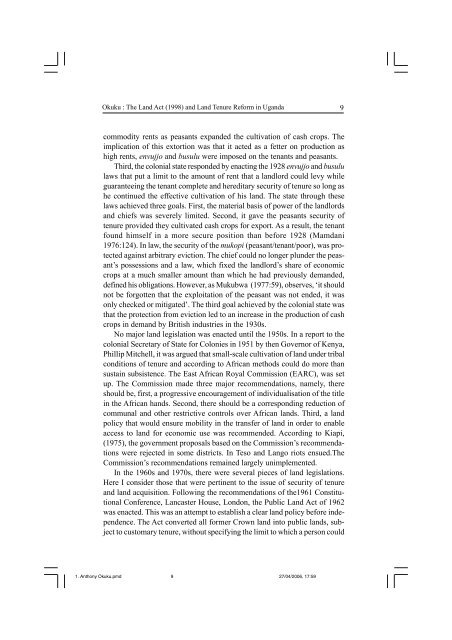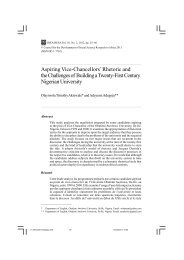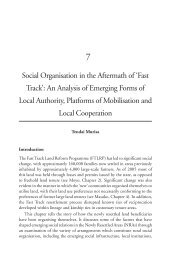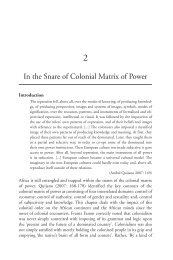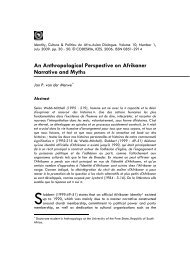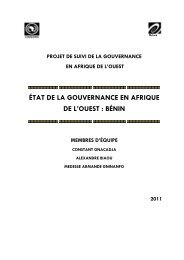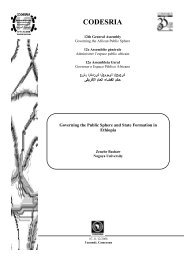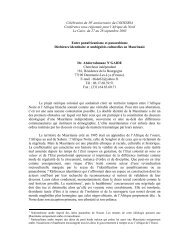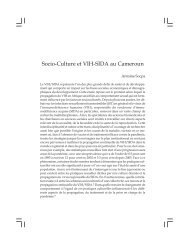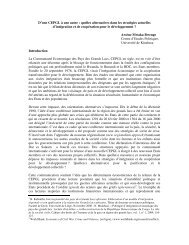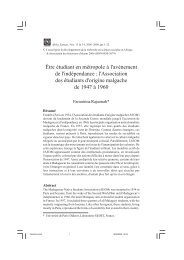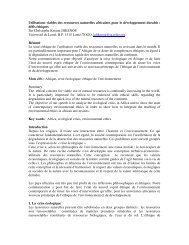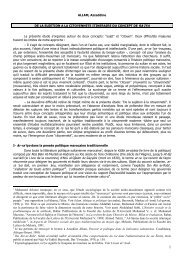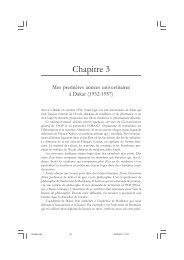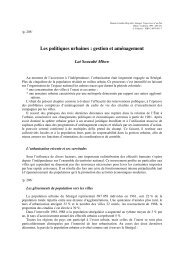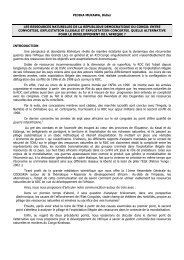and Land Tenure Reform in Uganda - codesria
and Land Tenure Reform in Uganda - codesria
and Land Tenure Reform in Uganda - codesria
You also want an ePaper? Increase the reach of your titles
YUMPU automatically turns print PDFs into web optimized ePapers that Google loves.
Okuku : The L<strong>and</strong> Act (1998) <strong>and</strong> L<strong>and</strong> <strong>Tenure</strong> <strong>Reform</strong> <strong>in</strong> Ug<strong>and</strong>a<br />
commodity rents as peasants exp<strong>and</strong>ed the cultivation of cash crops. The<br />
implication of this extortion was that it acted as a fetter on production as<br />
high rents, envujjo <strong>and</strong> busulu were imposed on the tenants <strong>and</strong> peasants.<br />
Third, the colonial state responded by enact<strong>in</strong>g the 1928 envujjo <strong>and</strong> busulu<br />
laws that put a limit to the amount of rent that a l<strong>and</strong>lord could levy while<br />
guarantee<strong>in</strong>g the tenant complete <strong>and</strong> hereditary security of tenure so long as<br />
he cont<strong>in</strong>ued the effective cultivation of his l<strong>and</strong>. The state through these<br />
laws achieved three goals. First, the material basis of power of the l<strong>and</strong>lords<br />
<strong>and</strong> chiefs was severely limited. Second, it gave the peasants security of<br />
tenure provided they cultivated cash crops for export. As a result, the tenant<br />
found himself <strong>in</strong> a more secure position than before 1928 (Mamdani<br />
1976:124). In law, the security of the mukopi (peasant/tenant/poor), was protected<br />
aga<strong>in</strong>st arbitrary eviction. The chief could no longer plunder the peasant’s<br />
possessions <strong>and</strong> a law, which fixed the l<strong>and</strong>lord’s share of economic<br />
crops at a much smaller amount than which he had previously dem<strong>and</strong>ed,<br />
def<strong>in</strong>ed his obligations. However, as Mukubwa (1977:59), observes, ‘it should<br />
not be forgotten that the exploitation of the peasant was not ended, it was<br />
only checked or mitigated’. The third goal achieved by the colonial state was<br />
that the protection from eviction led to an <strong>in</strong>crease <strong>in</strong> the production of cash<br />
crops <strong>in</strong> dem<strong>and</strong> by British <strong>in</strong>dustries <strong>in</strong> the 1930s.<br />
No major l<strong>and</strong> legislation was enacted until the 1950s. In a report to the<br />
colonial Secretary of State for Colonies <strong>in</strong> 1951 by then Governor of Kenya,<br />
Phillip Mitchell, it was argued that small-scale cultivation of l<strong>and</strong> under tribal<br />
conditions of tenure <strong>and</strong> accord<strong>in</strong>g to African methods could do more than<br />
susta<strong>in</strong> subsistence. The East African Royal Commission (EARC), was set<br />
up. The Commission made three major recommendations, namely, there<br />
should be, first, a progressive encouragement of <strong>in</strong>dividualisation of the title<br />
<strong>in</strong> the African h<strong>and</strong>s. Second, there should be a correspond<strong>in</strong>g reduction of<br />
communal <strong>and</strong> other restrictive controls over African l<strong>and</strong>s. Third, a l<strong>and</strong><br />
policy that would ensure mobility <strong>in</strong> the transfer of l<strong>and</strong> <strong>in</strong> order to enable<br />
access to l<strong>and</strong> for economic use was recommended. Accord<strong>in</strong>g to Kiapi,<br />
(1975), the government proposals based on the Commission’s recommendations<br />
were rejected <strong>in</strong> some districts. In Teso <strong>and</strong> Lango riots ensued.The<br />
Commission’s recommendations rema<strong>in</strong>ed largely unimplemented.<br />
In the 1960s <strong>and</strong> 1970s, there were several pieces of l<strong>and</strong> legislations.<br />
Here I consider those that were pert<strong>in</strong>ent to the issue of security of tenure<br />
<strong>and</strong> l<strong>and</strong> acquisition. Follow<strong>in</strong>g the recommendations of the1961 Constitutional<br />
Conference, Lancaster House, London, the Public L<strong>and</strong> Act of 1962<br />
was enacted. This was an attempt to establish a clear l<strong>and</strong> policy before <strong>in</strong>dependence.<br />
The Act converted all former Crown l<strong>and</strong> <strong>in</strong>to public l<strong>and</strong>s, subject<br />
to customary tenure, without specify<strong>in</strong>g the limit to which a person could<br />
1. Anthony Okuku.pmd 9<br />
27/04/2006, 17:59<br />
9


